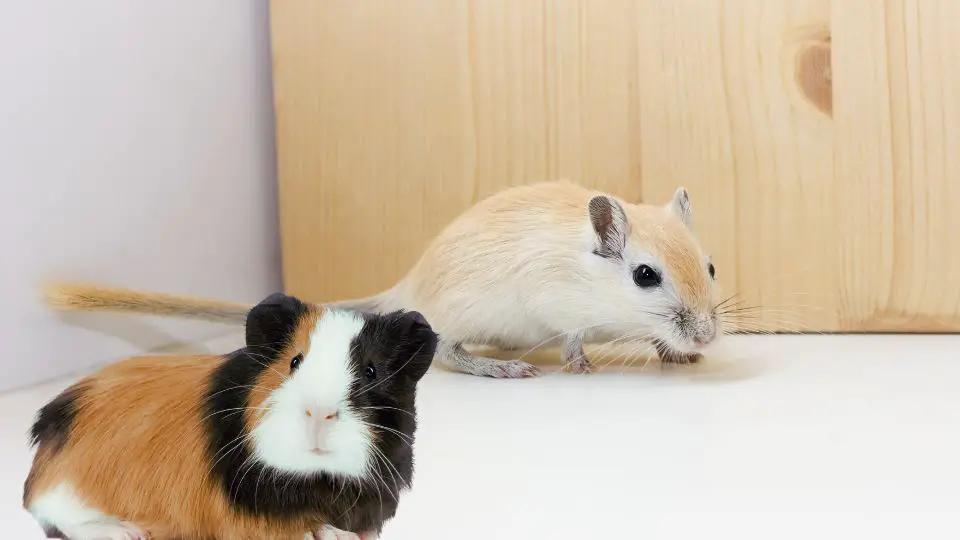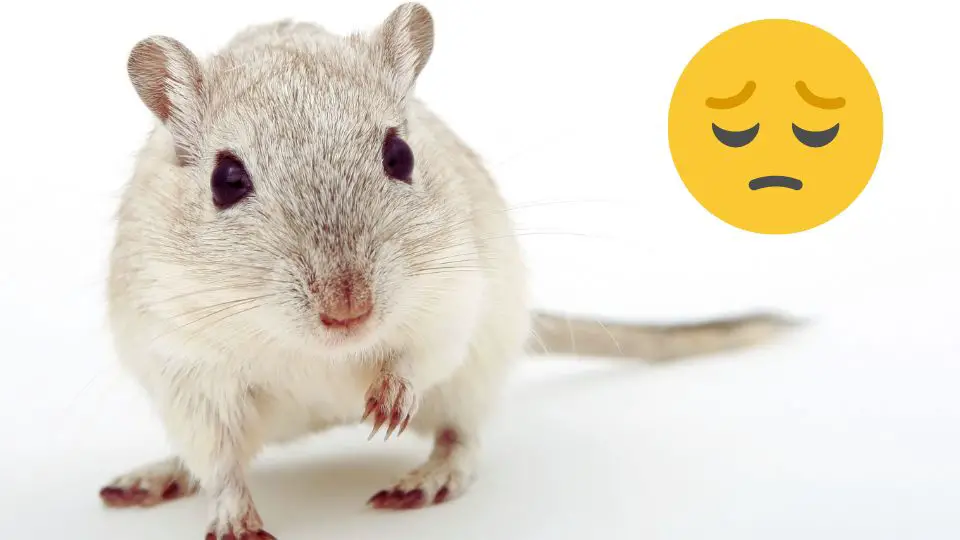A gerbil scent gland tumour is a type of cancer that can appear near a gerbil’s scent gland. Gerbils scent gland is located in the middle of their stomach, and it can be mistaken for a wound because it’s thin and long in size.
The gerbil scent gland tumor is a rare tumor that arises from the olfactory nerve. It can grow very quickly and cause the loss of smell. If not treated, the gerbil scent gland tumor can lead to death.
The biggest problem with a gland tumor is that there is no treatment, so your gerbil would require surgery it case he develops it, that can cost between $150 – $400. In this article, we talk about what are gerbils scent gland tumors, how to check if your little pet has one and what options do you have for treatments.
What Are Scent Gland Tumors in Gerbils?
The gerbil’s scent gland is located in the middle of their stomach. The gland is about the size of a pea and secretes a strong-smelling fluid. The fluid is used for many reasons, which include:
- to mark territory;
- to attract mates;
- and for females to see which male has the best genetics for mating.
Gerbils produce a fluid from their scent gland that is used to mark their territory and attract mates. This fluid, which is orange in colour, is left behind as the gerbil moves, where its belly touches things. Males produce more of this fluid than females and it is used in the various ways mentioned above.
Scent gland tumors are a type of cancer that grows in the cells that produce scents in rodents and other small animals. These tumors can occur anywhere in the body, but are most commonly found in the nose, brain, and lungs.
Although scent gland tumors can occur in any species of rodent, they are most commonly seen in gerbils.
The cause of scent gland tumors is unknown, but they may be caused by a combination of environmental and genetic factors.
Why Do Gerbils Get Scent Gland Tumors?
Gerbils can develop scent gland tumors as a result of a number of different factors. These tumors can arise from genetic abnormalities, exposure to certain chemicals, or even problems with the way the gerbil’s immune system is functioning. Scent gland tumors are typically benign but can occasionally be cancerous.
In order to prevent scent gland tumors in your gerbil, it’s important to know the signs and symptoms and to take steps to ensure your pet’s health and well-being.
One possible cause of these tumors is the gerbil’s natural behaviour. The gerbil rubs its stomach on objects to coat its fur with a strong odor that helps it to find food and safety. If this rubbing continues over time, the gland can become swollen and irritated. This can lead to the development of a tumor.
What is the most common place a gerbil will get a tumor?
The most common place a gerbil will get a tumor is the abdominal pad. Sebaceous, squamous cell, and adenocarcinoma tumors are more frequently found in males, while carcinoma of the ovary is, naturally, seen in females.
The best way to treat gerbil tumors is by surgically removing them. If the tumor is not removed, it can continue to grow and spread throughout the body. Gerbil tumors can be benign (non-cancerous) or cancerous. Benign tumors can often be removed surgically, but if the tumor is cancerous, it will require more extensive treatment. Cancerous tumors can often spread to other parts of the body and may require surgical removal.
How to Tell If Your Gerbil Has Scent Gland Tumor
If you have a gerbil that has an unusual appearance or if it doesn’t smell like usual, it might be suffering from a scent gland tumor. This tumor is unique in that it can often be identified by little gerbil lacking of smell.
If you think that your gerbil might have a scent gland tumor, make an appointment with your veterinarian as soon as possible to determine the best course of action.
A healthy scent gland looks as follows:
- It is in the middle of the stomach, along a long and thin line;
- Has an orange color, or a shade darker than the gerbil’s skin;
- Hairless, surrounded by belly hair.
You don’t normally look on your pet’s stomach, so that this scent gland tumors usually happens under the radar. And most of the times is too late to have a treatment apart from surgery.
How do I know if my gerbil is hurt?
If you want to know if your gerbil is hurt or having an illness or a tumor, there are some things you can look at.
Behaviour
The most obvious sign of pain is when your gerbil makes a sound. This could be anything from grumbling or whimpering to a loud scream or screech.
Hiding
Gerbils hide when they are in pain. So if you see that your small pet is hiding most of the time, it could be a sign that he doesn’t feel good.
Dry skin
If you’re noticing that your gerbil’s scent gland is drying out and there are large flakes of skin sticking out, it’s time to take your pet to the vet. This condition, called external dermatitis, is caused by a variety of things (like allergies), but can also be caused by a virus. If left untreated, external dermatitis can lead to gum disease, infection of the eyes or nose, and even death.
Bleeding
If your gerbil has a small open wound with a slight amount of bleeding, there may also be small amounts of dried blood around or on its scent gland. If the bleeding is excessive or if the gerbil doesn’t seem to be doing well, you should take it to a vet as soon as possible.
How to Check for Gerbil Scent Gland Tumors
Gerbil scent gland tumors are a common problem in gerbils. They can be hard to find, but if you know what to look for, you can diagnose them quickly. Here are some signs to watch for:
- A lump or mass on your gerbil’s scent gland. This may be small, but it should definitely be checked out.
- If a gerbil’s scent gland is swollen, it may be due to an infection. It could also signal that the animal has some sort of tumor.
- A small amount of blood around or on your gerbil’s scent gland.
Generally, you have to do a manual check for gerbils scent gland tumors. Here is a method to do that:
- Take your gerbil out from the cage and examine the scent gland.
- Look after symptoms as: redness, swelling, dried blood, dry skin or hard lumps.
- Take photos where you see unusual things, check him again later and compare with the photos taken previously.
If you own a gerbil, then you know that they are active animals. This means that they will likely not enjoy being flipped upside down. If your gerbil feels this way, put it inside a clear plastic container so it can escape the flipping and be stationary. If you find something abnormal, get your gerbil to the vet.
How do I know if my gerbil has a tumor?
There are several types of tumors that can be found in the gerbil’s internal organs. These tumors are typically hard to identify because external signs are rarely shown, however, there are some good indicators of these tumors.
Depression, loss of appetite, and abdominal pain are all common signs that something is wrong with a gerbil’s health.
If you notice any of these symptoms in your pet, it is important to take him or her to the vet for a check-up.
Scent Gland Tumor Treatment
If you have a gerbil with a tumor on its scent gland, the only way to treat it is through surgery. There is no such thing as chemotherapy for gerbils, so cancer must be cut out. Only a veterinarian can perform this procedure and they will need to know about your gerbil’s anatomy in order to do it correctly.
Scent Gland Tumor Surgery
When a tumor grows on this gland, it can obstruct the flow of urine and saliva, which can lead to dehydration and death. If the tumor is removed during surgery, the gerbil can keep the use of its scent gland and continue to live as usual.
There are a few different options available to veterinarians when it comes to treating a tumor. These include removing the tumor alone or removing the scent gland and tumor together. The decision of which option to use depends on the location of the tumor.
The average cost for a gerbil gland tumor removal ranges from $150 to $400. This covers the cost of anesthesia, surgery, and subsequent pain medication.
Non-Surgical Treatment
If you feel that you cannot afford to have your gerbil undergo surgery, you can’t stop the tumor in other ways. The tumor will continue growing and may become large and difficult to handle. What you can do is to make your gerbil life better. Provide plenty of fresh vegetables and fruits for him, avoid fatty foods, and make sure he has a comfortable habitat with plenty of toys.
Conclusion
In conclusion, scent gland tumors are a fairly common occurrence in gerbils. They are usually benign, but can be cancerous. The only treatment for a gerbil scent gland tumor is surgery, so if you suspect your gerbil has a tumor, take it to the vet for diagnosis and treatment.







